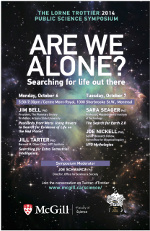
How did life originate and are we alone? Perhaps the two most intriguing questions that have puzzled mankind since the dawn of civilization. Countless science fiction stories and movies speak to our infatuation with the possibility of intelligent alien life but so far such accounts remain firmly in the realm of science fiction. But for how long? Famed science popularizer and astrophysicist Carl Sagan expressed his wonderment at the vastness of space and time with his conclusion that "the total number of stars in the Universe is larger than all the grains of sand on all the beaches of the planet Earth." Since those stars likely have planets orbiting them, it stands to reason that some of them would have conditions conducive to life. Even if intelligent life occurs on only a minute proportion of these planets, there could be numerous civilizations in our own Milky Way galaxy alone. So far we have discovered no evidence of their existence. It isn’t for lack of trying.
Investigators of unidentified flying objects (UFOs) have found no sign of aliens despite thoroughly scrutinizing numerous sightings. The Center for Search for Extraterrestrial Intelligence (SETI) has been scanning the heavens with its alien-hunting radio telescopes since the 1980s without any success. On the other hand, since the 1990s a number of “exoplanets,” that is planets around other stars, have been detected by space telescopes. At least one, Kepler-186f, has caused a great deal of excitement because of its presence in the “Goldilocks zone,” a habitable orbit that is “not too hot and not too cold” for the presence of liquid water. That planet is practically in our back yard, being only 490 light years away, but that still makes it far enough to make visiting it out of the question. However, taking the next step into space to look for signs of life is a possibility. That would be a trip to Mars. Our astronauts will not be encountering any Martians, but unmanned exploration has already suggested that the “red planet” may at one time have fostered some sort of microbial life. Star Trek may have been science fiction, but real science stands ready to take up the challenge to “explore strange new worlds, to seek out new life and new civilizations and to boldly go where no man has gone before.” Our expert speakers will fascinate us with research that is simply out of this world.
McGill University is proud to host the tenth annual Lorne Trottier public science symposium, made possible through the generous support of Dr. Lorne Trottier and honouring his wish “to hold a public forum to inform, inspire debate and raise public awareness on contemporary issues confronting society today”.